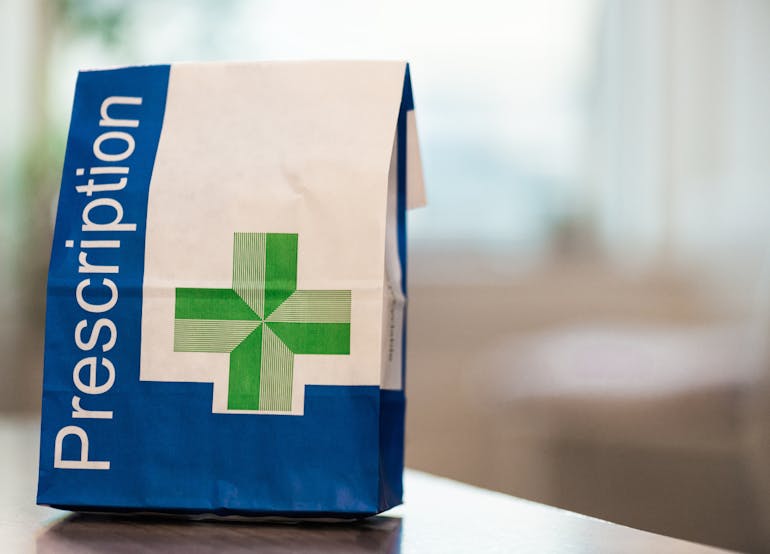How Long Will a Pharmacy Hold Your Prescription For in the UK?
Reviewed and fact-checked by Giulia Guerrini, Superintendent Pharmacist. Read our editorial policy to see how we create informative, accurate content.
In the UK, prescriptions are issued by doctors or medical specialists to prevent, treat, or manage an illness. Some medicines, such as those for minor illnesses, can be bought over the counter without a prescription (we sell tons of them and deliver them right to you!). For example, you can buy cough remedies and simple painkillers without needing a prescription.
Other types of medicine, such as emergency contraception or eyedrops, are issued without a prescription but under the supervision of a pharmacist. You can only purchase them from a pharmacy and might have to answer some questions or fill out a questionnaire before the pharmacist approves and sells you the medicine.
Prescription-only medicines, such as antibiotics, must be prescribed by a qualified healthcare professional. Usually, it would be a GP, but could also be a dentist, nurse, hospital doctor, optometrist, pharmacist, podiatrist, or physiotherapist.
It’s also possible to buy a variety of medicines online, but you should only make purchases from reputable online stockists, like us. You cannot purchase prescription-online medicines online – you need the prescription first, to be safe.
Electronic Prescriptions
In the UK, most prescriptions are now electronic. The healthcare professional signs and sends the prescription electronically and they are also processed electronically. Typically, there are two options:
- You choose a dispenser or pharmacy for all your prescriptions: The prescription is sent electronically to your preferred dispenser. You can then collect it – or, if we’re your nominated pharmacy, we’ll send it straight to your home once dispensed – and there is no need to hand over a paper prescription.
- You choose a dispenser or pharmacy for each prescription: If you choose this option, you’ll be given a paper copy of the prescription that you can take to your preferred pharmacist or dispenser. They scan the barcode that’s on the prescription which downloads it from the NHS database. You’ll need to take time out of your day to get there, and it takes longer while you wait for it to be dispensed.
How Long Will a Pharmacy Hold a Prescription?
Once a pharmacy or dispenser has received your electronic prescription the length of time they’ll hold onto it varies. Typically, you can expect them to keep it for up to 14 days.
You should try to collect your prescribed medication as soon after you’ve requested it as possible. That way you’ll reduce the risk of running out or the pharmacy discarding your prescription. We know that’s frustrating when you have a a busy life. That’s why we’re all about dispensing and delivering to your door, so you don’t have to think about it.
Nominate us to be your pharmacy, and you never have to worry about picking up your prescriptions or accidentally leaving them too long to be picked up again.
Different Types of Prescriptions
Healthcare professionals can issue one of the following types of prescriptions:
Acute Prescriptions
These are issued by a GP but aren’t added to a repeat prescription list. This might be because it’s a new medication that the GP needs to monitor to ensure it’s appropriate for your needs.
Generally, you’ll take the medication for a short period and won’t need to take it regularly. On the other hand, it may be a high-risk medication that needs close monitoring from your GP and isn’t appropriate for repeat prescribing.
To order this type of prescription, you must put in a request with your GP using the usual order method. This might be an online message, a paper request handed into the surgery or sent in the post. The doctor will decide whether or not the medication can be issued.
Before you visit your preferred pharmacy, it’s best to contact your GP’s surgery to check whether the prescription has been done and sent out – otherwise you could be waiting for no reason.
Repeat Prescriptions
These are for medications that our GP thinks you’ll need to take for a long time. The medication is added to your repeat medication list and will be available for you or a trusted representative. You or your representative will be able to order the medication, but you must allow enough time to make sure you don’t run out.
Repeat Dispensing Prescriptions
These are NHS repeatable prescriptions. Your GP decides whether your medication is appropriate for Repeat Dispensing. A prescription of your repeat medications is sent to your preferred pharmacy and it can issue your prescription more than once, depending on how many times are specified.
How Do Repeat Prescriptions Work?
If your doctor is happy for you to take certain medicines regularly, they will set up a repeat prescription. They usually do this after you’ve been monitored for potential side effects and reactions.
It will be your responsibility to request the medication yourself and then collect it a few days later from your nominated pharmacy. It’s also possible for your surgery to set it up so that you don’t have to request the medication. Instead, it’s dispensed automatically. You just have to remember to go and pick it up – or nominate us as your pharmacy and we’ll deliver it.
How to Order, Collect, and Reorder a Repeat Prescription
The method for ordering your repeat prescription will vary, depending on your GP practice system. In most cases, you can do it online.
How Long is a Prescription Valid For?
Standard prescriptions are valid for 6 months from the date on the prescription. However, if the prescribed medicine is controlled (for example, pethidine, methadone, or morphine), the prescription is only valid for 28 days from the date on the prescription.
The date on the prescription can be either:
- The date the health professional who issued the prescription signed it
- The date the health professional has stated the medicine should not be dispensed before
Repeat prescriptions can be valid beyond 6 months, following the first time the medicine was dispensed.
How Much do NHS Prescriptions Cost?
Most adults in the UK have to pay prescription charges. The current prescription charge is £9.35 per item. You have the option of purchasing a prescription prepayment certificate (PPC) if you want to save money on the cost of your prescriptions. Here are the current prices:
- A 3-month PPC will cost £30.25
- A 12-month PPC will cost £108.10
Some items are always free – for example, medicines prescribed for hospital inpatients and contraceptives.
Free prescriptions are also available for the following patients:
- Children under the age of 16
- Adults aged 60 and over
- Students in full-time education between the ages of 16 and 18
- Pregnant women or those who have had a baby in the previous 12 months and hold a valid maternity exemption certificate
- People with a physical disability that prevents them from going out without help and who hold a valid medical exemption certificate
- People with a specified medical condition who also have a valid medical exemption certificate
- NHS inpatients
- People who hold a valid war pension exemption certificate and the prescription if got an accepted disability
- This who are in receipt of various benefits
- Those who hold a valid NHS tax credit exemption certificate or a valid NHS certificate for full help with help costs
We hope that’s helped – and if you want to nominate us to be your pharmacy, we’ll dispense and deliver your prescriptions to you, to make things simple. How amazing is that? Read more about it here.

